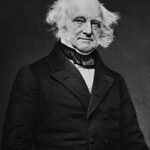President Martin Van Buren faced the most severe economic crisis in American history when the Panic of 1837 struck. His response would define his presidency and reshape American politics forever.
The Panic of 1837 Begins
The economic collapse began in May 1837, just months after Van Buren took office. Banks failed across the nation as credit dried up completely. Unemployment soared to unprecedented levels while businesses shuttered their doors. 📊 Over 600 banks suspended operations during the crisis’s peak years.
Van Buren’s Laissez-Faire Response
Van Buren firmly believed government intervention would worsen the crisis. He rejected calls for federal assistance to struggling banks and businesses. The president argued that natural economic cycles would correct themselves without interference. ⚠️ This philosophy directly contradicted public demands for immediate government action.
The Independent Treasury System
Van Buren’s only major response was proposing the Independent Treasury System. This plan would separate federal funds from private banks entirely. Critics argued this approach would further restrict credit and worsen conditions. 💰 The proposal faced fierce opposition in Congress for two years.
Impact:
Van Buren’s inaction during the Panic of 1837 created devastating consequences that lasted for years. His refusal to provide federal assistance fundamentally changed American political dynamics.
Economic Devastation Spreads
The economic collapse deepened without federal intervention. Unemployment reached 25% in major cities like New York and Philadelphia. 📉 Agricultural prices plummeted by 40% as farmers lost their land to foreclosure. The crisis lasted until 1843, making it America’s longest depression.
Political Backlash and Nickname
Van Buren earned the devastating nickname ‘Martin Van Ruin’ from angry voters. His Democratic Party lost control of Congress in 1838 midterm elections. 🔥 Whig opponents successfully blamed Van Buren’s policies for prolonging national suffering. The president’s approval ratings collapsed to historic lows.
Long-term Political Consequences
The 1840 presidential election became a referendum on Van Buren’s leadership. William Henry Harrison defeated the incumbent in a landslide victory. Van Buren’s defeat marked the end of Jacksonian Democratic dominance. 🌍 The crisis established precedents about federal responsibility during economic emergencies that would influence future presidents.
